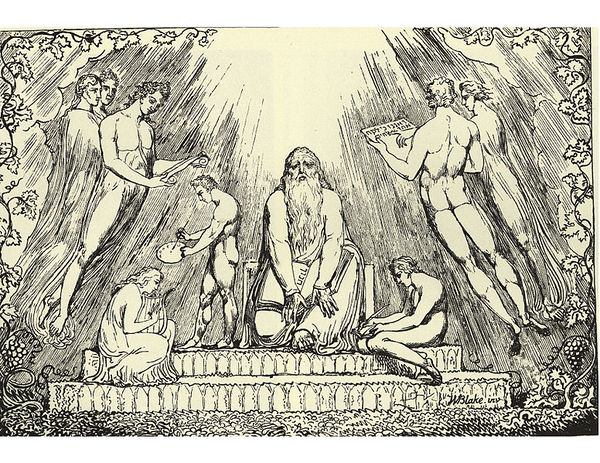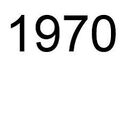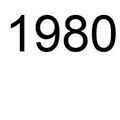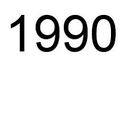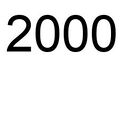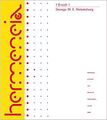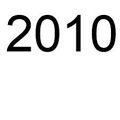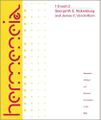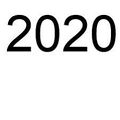Difference between revisions of "Category:Enochic Studies"
| Line 47: | Line 47: | ||
If at the end of the 18th century there were only four Ethiopic manuscripts available in Europe, during the 19th century the number of manuscripts available increased dramatically as the result of expeditions in Ethiopia and acquisitions from antiquity dealers. Copies of 1 Enoch were now present in libraries in England, France, Germany and Italy. | If at the end of the 18th century there were only four Ethiopic manuscripts available in Europe, during the 19th century the number of manuscripts available increased dramatically as the result of expeditions in Ethiopia and acquisitions from antiquity dealers. Copies of 1 Enoch were now present in libraries in England, France, Germany and Italy. | ||
In 1851 [[August Dilmann]] published the first eclectic edition based on 5 manuscripts, and in 1853 a German translation with commentary. New translations appeared: in French (Brunet, 1856), English ([[George Schodde]], 1882), and Hebrew ([[Lazarus Goldschmidt]]). | In 1851 [[August Dilmann]] published the first eclectic edition based on 5 manuscripts, and in 1853 a German translation with commentary. New translations appeared: in French (Brunet, 1856), English ([[George H. Schodde]], 1882), and Hebrew ([[Lazarus Goldschmidt]]). | ||
====The Critical Study of 1 Enoch (1893-1950)==== | ====The Critical Study of 1 Enoch (1893-1950)==== | ||
Revision as of 11:36, 5 February 2014
|
Overview Enochic Studies / Research in the Enochic Literature is a field of research in Second Temple Judaism, that specializes in the study of Enoch and the literature attributed to him (1 Enoch, 2 Enoch, and 3 Enoch).
History of research The "Lost" Book and the Fragments of Syncellus (9th-18th cent.)For many centuries the Book of Enoch was considered to be "lost" in the West. But its memory remained vivid in the Church and some important portions of the ancient Greek version resurfaced in the World Chronicle written by George Syncellus at the turn of the 9th century. The figure of Enoch continued to inspire the leaders of millenaristic movements, notably, Jan Matthys who in 1534 ruled the city of Münster, Germany as the "New Jerusalem," claiming to be Enoch waiting for the return of Christ. The Greek fragments of George Syncellus were first published by Joseph Justus Scaliger in 1606 and discussed by Johannes Drusius in 1612. Jacques Goar translated them into Latin in 1652, when he published the editio princeps of Syncellus' Chronography. Until the end of 18th century the interest of scholars remained focused on these Greek fragments, which provided the only textual evidence for 1 Enoch. They were included in works by Athanasius Kircher (Oedipus Aegyptiacus, 1652-54), Gottfried Vockerodt (De societatibus et re literaria ante diluvium, 1687), Scipione Sgambati (Archivorum veteris testamenti, 1703), and Johann Albert Fabricius (Codes pseudepigraphus Veteris Testamenti, 1713-23). The Fragments were translated into French (Pierre Jurieu, Histoire critique des dogmes et des cultes, 1704), German (Johann Christian Nehring, Neun Bücher Sibyllinischer Prophezeyungen, 1719), and partly, in English (A Universal History, vol.1, 1747; translated into Italian in 1765). In 1710 Pompeo Sarnelli authored the first commentary on the surviving portions of the Book the Watchers. Nicolas Antoine Boulanger and Paul-Henri Thiry d'Holbach used the Syncellus fragments in their dissertation on Enoch (1762). In 1820 Daniele Manin published another Italian commentary still based on the Greek of Syncellus. The Rediscovery of the whole Ethiopic Text of 1 Enoch (1773-1892)Reports about the existence of a complete Ethiopic version of 1 Enoch first circulated in the West during the first half of the 17th century. The French intellectual and collector Nicolas-Claude Fabri de Peiresc (1580-1637) made strong efforts to recover the book but without success. In 1773 the explorer James Bruce finally reached Ethiopia and brought back three copies of the Ethiopic version of the whole 1 Enoch. One copy was presented to King Louis XV of France and ended in the Bibliothèque Nationale de Paris; a second was given to the Bodleian Library in Oxford; and the third was retained by Bruce for himself, being added to the Bodleian collections after his death in 1794. Bruce's manuscripts, however, were not the only copies of 1 Enoch in Europe at that time. Another manuscript of 1 Enoch appeared in those same years in Italy, in the library of Card. Leonardo Antonelli; its provenance remains unknown. In 1775 the manuscript was examined by orientalist Agostino Antonio Giorgi, but remained unpublished. Shortly after Antonelli's death, it was purchased by Angelo Mai and became part of the collections of the Biblioteca Apostolica Vaticana. The First Printed editions and Translations of 1 (Ethiopic) EnochSilvestre de Salcy was the first scholar to publish a translation (in Latin) of portions of the Paris manuscript, with notes in French (1800). His notes were translated into German in 1801. Eventually, Richard Laurence published in 1821 the first English translation of the whole 1 Enoch, followed by the editio princeps of the Ethiopic text in 1838. Two German translations (Hoffmann, 1833-38; and Clemens, 1850) and a Latin translation (Gfrörer, 1840), contributed to the book If at the end of the 18th century there were only four Ethiopic manuscripts available in Europe, during the 19th century the number of manuscripts available increased dramatically as the result of expeditions in Ethiopia and acquisitions from antiquity dealers. Copies of 1 Enoch were now present in libraries in England, France, Germany and Italy. In 1851 August Dilmann published the first eclectic edition based on 5 manuscripts, and in 1853 a German translation with commentary. New translations appeared: in French (Brunet, 1856), English (George H. Schodde, 1882), and Hebrew (Lazarus Goldschmidt). The Critical Study of 1 Enoch (1893-1950)The knowledge of 1 Enoch was advanced by the discovery of new Ethiopic manuscripts and by the publication in 1892-93 of a new Greek text (containing chs. 1-32). The ms (found in 1886-87 in Egypt) gave scholars not only a text larger than the one provided by the fragments of George Syncellus, but also a better understanding of the history of transmission of the text from the Semitic original to the Ethiopic. The English translation of Robert Henry Charles in 1893 was the first to use critically all this new material, thus opening a new stage in the history of research. It was now possible to produce the first critical editions of the Ethiopic text--by Flemming in 1901, and Charles in 1906. New translations appeared--Beer 1900 [German]; Flemming 1901 [German]; Martin 1906 [French]; Charles 1912, and 1913 [English]. Riessler 1928 [German]). The pre-Christian date of the entire document (including the Parables) seemed to be solidly established and accepted (Gry 1909). In comparison to the numerous publications at the turn of the century, only a limited number of studies appeared between the two World Wars. Notably, the material from Enoch was included by Paul Billerbeck in his Kommentar sum Neuen Testament (1924) and in Riessler's collection of OT Pseudepigrapha in German (1928). The major new resource was the discovery (in 1929) and publication (in 1937 by Campbell Bonner) of the Chester Beatty Papyrus, which preserved the Greek text of chaps. 97-107. The scholarly discussion remained focused on issues of primary interest for Christian theologians, in particular about the figure of the Son of Man in the Book of Parables, for its implication on the origin and development of early Christology. 1 Enoch in Limbo (1951-1975)In 1951 a dramatic announcement shook the world of Enochic Studies. Józef T. Milik confirmed the presence at Qumran of Aramaic fragments from all Enoch booklets except the Parables. The rediscovery of significant portions of the original text was the beginning of a new chapter in the history of research even though in the immediate it resulted into a major setback. Twenty-five years passed from that dramatic announcement to the actual publication of the Aramaic Enoch fragments. For all those years, 1 Enoch was in limbo. A few new translations appeared, one in Danish (1956), two in Hebrew (1956, 1958), and one in Modern Greek (1973). Not surprisingly, the only major study of the period was Matthew Black's edition of the Greek fragments in 1970. Waiting for the actual publication of the Aramaic texts was necessary—it was simply a matter of good sense. The Publication of the Aramaic Fragments by Milik (1976-2000)The edition of the Qumran fragments by Józef T. Milik in 1976 reopened the research on 1 Enoch. In 1978 Michael Knibb published of a new edition of the Ethiopic text, which for the first time compared it with the newly founded fragments (Knibb 1978). Three scholars led the renaissance of Enochic Studies--George W.E. Nickelsburg and James C. VanderKam in the United States and Paolo Sacchi (and his students and collaborators Sabino Chiala and Gabriele Boccaccini) in Europe. In the 1980s numerous new translations (Fusella 1981 [Italian]; Corrente/Piñero 1982 [Spanish]; Isaac 1983 [English]; Knibb (1984) [English]; Uhlig 1984 [German]; Black (1985) [English]; Caquot (1987) [French]) laid the foundation for a reevaluation of the importance of 1 Enoch within Second Temple Jewish literature. The Enoch Seminar and the Hermeneia commentaries (2001-present)The year 2001 marks a turning point in Enochic Studies. In the Summer 2001 the main American and European specialists in 1 Enoch gathered in Florence, Italy at the invitation of Gabriele Boccaccini for the first meeting of the Enoch Seminar, and in the Fall of the same year the first volume of the Hermeneia commentary was published by George W.E. Nickelsburg. References
|
Categories
Texts
Chronology
Languages
Countries
|
Pages in category "Enochic Studies"
The following 172 pages are in this category, out of 172 total.
- Enochic Studies (1450s)
- Enochic Studies (1500s)
- Enochic Studies (1600s)
- Enochic Studies (1700s)
- Enochic Studies (1800s)
- Enochic Studies (1850s)
- Enochic Studies (1900s)
- Enochic Studies (1910s)
- Enochic Studies (1920s)
- Enochic Studies (1930s)
- Enochic Studies (1940s)
- Enochic Studies (1950s)
- Enochic Studies (1960s)
- Enochic Studies (1970s)
- Enochic Studies (1980s)
- Enochic Studies (1990s)
- Enochic Studies (2000s)
- Enochic Studies (2010s)
- Enochic Studies (2020s)
*
~
- George Syncellus (d. after 811), scholar
- Robert Grosseteste (M / Britain, 1175c-1253), scholar
- Menahem Recanati (M / Italy, 1250-1310), scholar
- Guglielmo Raimondo Moncada (M / Italy, 15th cent.), scholar, translator
- Johannes Reuchlin (M / Germany, 1455-1522), scholar
- Francesco Zorzi (M / Italy, 1460-1540), scholar
- Giovanni Pico della Mirandola (M / Italy, 1463-1494), scholar
- Ludovico Ariosto (M / Italy, 1474-1533), poet
- Giovanni Agostino Panteo (M / Italy, d.1535), alchemist
- Jan Matthys (M / Netherlands, 1500-1534), visionary
- Anthony Gilby (M / Britain, 1510-1585), scholar, translator
- Jacques Lefèvre d'Étaples (M / France, 1455-1536), scholar
- Guillaume Postel (M / France, 1510-1581), scholar
- Guglielmo Sirleto (M / Italy, 1514-1585), scholar
- John Dee (M / Britain, 1527-1608), occultist
- Mordecai Jaffe (M / Czechia, 1530-1612), scholar
- Joseph Justus Scaliger (M / Netherlands, 1540-1609), scholar
- Johannes Drusius (M / Netherlands, 1550-1616), scholar
- Edward Kelley (M / Britain, 1555-1597), occultist
- Isaac Casaubon (M / France, 1559-1614), scholar
- Nicolao Godinho (M / Portugal, 1559-1616), Portuguese scholar
- Luis de Urreta (1570-1636), Spanish scholar
- Samuel Purchas (1577-1626), scholar
- Jacques Bolduc
- Nicolas-Claude Fabri de Peiresc (M / France, 1580-1637), scholar
- Gilles de Loches
- Pierre Gassendi
- Scipione Sgambati (M / Italy, 1595-1652), scholar
- Agathange de Vendôme
- Méric Casaubon (1599-1671), scholar
- Peter Heylyn (1599-1662), scholar
- Thomas Bangius (M / Denmark, 1600-1661), scholar
- Jacques Goar (M / France, 1601-1653), scholar
- Athanasius Kircher (M / Germany, 1601/02-1680), scholar
- Christianus Schotanus (1603-1671), Dutch scholar
- Thomas Browne (1605-1682), scholar
- John Milton (M / Britain, 1608-1674), poet, playwright
- Johannes Heinrich Ursinus
- Johann Heinrich Hottinger (1620-1667), scholar
- Jane Lead (F / Britain, 1623-1704), visionary
- Hiob Ludolf (M / Germany, 1624-1704), scholar
- Johann Heinrich Heidegger (1633-1698), Swiss scholar
- August Pfeiffer (M / Germany, 1640-1698), German scholar
- Gottfried Vockerodt (1665-1727), German scholar
- ~ Joannes Ernestus Grabe (1666-1711), German-British scholar
- William Whiston (1667-1752), scholar
- Johann Albert Fabricius (M / Germany, 1668-1735), scholar
- Johann Christian Nehring (M / Germany, 1671-1736), scholar
- Pierre Jurieu (M / France, 1637-1713), scholar
- Pseudo-vetus testamentum (1707 Mölling / Schmidt), dissertation
- Agostino Antonio Giorgi (M / Italy, 1711-1797), scholar
- Nicolas Antoine Boulanger (1722-1759), scholar
- James Bruce (1730-1794), traveler
- Richard Laurence (M / Britain, 1760-1838), scholar
- Moses Stuart (M / United States, 1780-1852), scholar
- Andreas Gottlieb Hoffmann (1796-1864), German scholar
- Edward Murray (1798-1852), British scholar
- Jacques-Paul Migne (1800-1875), scholar
- Wilhelm Dindorf (1802-1883), German scholar
- Heinrich Ewald (1803-1875), scholar
- Samuel Davidson (1807-1898), scholar
- Alphonse Louis Constant (M / France, 1810-1875), occultist
- August Dillmann (1823-1894), German scholar
- ~ Theodor Zahn (1838-1933), German scholar
- Charles Taylor (1840-1908), scholar
- Oscar von Gebhardt (1844-1906), scholar
- Eberhard Nestle (1851-1913), scholar
- Johannes Flemming (1854-1914), German scholar
- S.L. MacGregor Mathers (1854-1918), occultist
- George H. Schodde (1854-1917), scholar
- Aleksandr V. Smirnov (M / Russia, 1854-1919), scholar
- Robert Henry Charles (1855-1931), scholar
- Matvei I. Sokolov (M / Russia, 1855-1906), scholar
- Montague Rhodes James (1862-1936), scholar
- Nathaniel Schmidt (M / Sweden, United States, 1862-1939), scholar
- ~ Charles Cutler Torrey (1863-1956), American scholar
- ~ F. Crawford Burkitt (1864-1935), British scholar
- Adolf Deissmann (1866-1937), scholar
- William O.E. Oesterley (1866-1950), scholar
- Heinrich Appel
- Adolphe Lods (M / France, 1867-1948), scholar
- François Martin (M / France, 1867-1928), scholar
- Ludwig Radermacher (1867-1852), scholar
- Lazarus Goldschmidt (1871-1950), scholar
- Edgar J. Goodspeed (1871-1962), scholar
- Kirsopp Lake (1872-1946), scholar
- Aleister Crowley (1875-1947), occultist
- Erik Peterson
- Alfredo Vitti
- André Vaillant (1890-1977), scholar
- Béla Hamvas (1897-1968), scholar
- Hugo Odeberg (1898-1973), scholar
- Otto E. Neugebauer (1899-1990), scholar
- Günther Zuntz (1902-1992), scholar
- Erik Konstans Teodor Sjöberg (1907-1963), scholar
- Matthew Black (1908-1994), British scholar
- Sergio Donadoni (M / Italy, 1914-2015), scholar
- Pierre Grelot (1917-2009), scholar
- Mathias Delcor (1919-1992), Spanish-French scholar
- Mario Pincherle (M / Italy, 1919-2012), arch-fi author
- Joseph A. Fitzmyer (1920-2016), American scholar
- ~ André Caquot (1923-2004), French scholar
- James Barr (1924-2006), British scholar
- Jonas C. Greenfield (1926-1995), scholar
- Marc Philonenko (1930-), scholar
- Paolo Sacchi (M / Italy, 1930), scholar
- Rochus Zuurmond (M / Netherlands, 1930-2020), scholar
- George W.E. Nickelsburg (1934-), scholar
- Ephraim Isaac (b.1936), scholar
- Michael A. Knibb (M / Britain, 1938), scholar
- Michael E. Stone (1938-), scholar
- Devorah Dimant (b.1939), scholar
- ~ Paul D. Hanson (1939-), American scholar
- James H. Charlesworth (1940-), scholar
- Maurice Casey (1942-2014), British scholar
- Gerald Schueler (1942-2013), occultist
- Margaret Barker (F / Britain, 1944), scholar
- William R.G. Loader (b.1944), scholar
- Daniel Boyarin (M / United States, 1946), scholar
- John J. Collins (1946-), scholar
- Mogens Müller (M / Denmark, 1946), scholar
- James C. VanderKam (M / United States, 1946), scholar
- István Baán (b.1948), scholar
- Helge S. Kvanvig (M / Norway, 1948), scholar
- Ida Fröhlich (F / Hungary, 1949), scholar
- ~ David R. Jackson (b.1951), Australian scholar
- Gabriele Boccaccini (b.1958), Italian-American scholar
- Andrei A. Orlov (M / Russia, United States, 1960), scholar
- Loren T. Stuckenbruck (b.1960), scholar
- Igor R. Tantlevskij (M / Russia, 1961), Russian scholar
- Giovanni Ibba (M / Italy, 1962), scholar
- Henryk Drawnel (b.1963), Polish scholar
- Michael Segal (1972-), scholar
- Annette Yoshiko Reed (F / United States, 1973), scholar
- Michaël Langlois (1976-), scholar
- Pierpaolo Bertalotto (1978-), scholar
- ~ Randal A. Argall, American scholar
- ~ Leslie Baynes, American scholar
- ~ Roger T. Beckwith, British scholar
- Andreas Bedenbender, scholar
- Robert A. Coughenour
- Charles A. Gieschen, scholar
- Grant Macaskill, scholar
- Leslie W. Walck, scholar
- James A. Waddell
Media in category "Enochic Studies"
The following 61 files are in this category, out of 61 total.
- 1713 Fabricius.jpg 326 × 500; 30 KB
- 1820 * Manin.jpg 138 × 200; 7 KB
- 1970.jpg 225 × 225; 4 KB
- 1976 * Milik.jpg 471 × 640; 17 KB
- 1978 Knibb.jpg 352 × 500; 18 KB
- 1978 Laycock.jpg 333 × 500; 37 KB
- 1979 * Suter.jpg 260 × 402; 7 KB
- 1979 Hartman.jpg 360 × 585; 28 KB
- 1979 Zamorani.jpg 424 × 592; 20 KB
- 1980.jpg 225 × 225; 4 KB
- 1980 * Stone.jpg 319 × 499; 27 KB
- 1984 * VanderKam.jpg 333 × 500; 18 KB
- 1988 Kvanvig.jpg 128 × 195; 2 KB
- 1989 Adler.jpg 683 × 920; 113 KB
- 1990.jpg 225 × 225; 4 KB
- 1990 * Sacchi.jpg 357 × 499; 22 KB
- 1993 * Tiller.jpg 317 × 474; 18 KB
- 1995 * VanderKam.jpg 328 × 499; 21 KB
- 1995 VanderKam Adler.jpg 333 × 500; 14 KB
- 1997 * Chiala.jpg 320 × 500; 28 KB
- 1997 Stuckenbruck.png 361 × 536; 40 KB
- 1998 * Boccaccini.jpg 336 × 499; 49 KB
- 2000.jpg 226 × 226; 6 KB
- 2000 Bedenbender.jpg 320 × 499; 20 KB
- 2001 * Nickelsburg.jpg 357 × 400; 14 KB
- 2002 * Boccaccini.jpg 337 × 499; 28 KB
- 2002-E * Boccaccini.jpg 1,313 × 1,841; 975 KB
- 2003 * Bautch.jpg 427 × 648; 30 KB
- 2004 Auffarth (ed).jpg 400 × 611; 234 KB
- 2004 Jackson.jpg 307 × 499; 11 KB
- 2004 Nickelsburg VanderKam.jpg 335 × 499; 26 KB
- 2004 Olson.jpg 384 × 500; 36 KB
- 2005 * Reed.jpg 375 × 500; 40 KB
- 2005-E * Boccaccini.jpg 333 × 499; 39 KB
- 2007-E * Boccaccini Collins.jpg 333 × 499; 13 KB
- 2007-E * Boccaccini.jpg 333 × 499; 40 KB
- 2009 Boccaccini (ed).jpg 333 × 499; 31 KB
- 2009 Knibb.jpg 1,904 × 2,891; 758 KB
- 2010.jpg 225 × 225; 4 KB
- 2011 * Waddell.jpg 333 × 499; 12 KB
- 2011 Walck.jpg 314 × 499; 16 KB
- 2012 * Boyarin.jpg 344 × 499; 53 KB
- 2012 * Nickelsburg VanderKam.jpg 421 × 500; 21 KB
- 2012 Arcari.jpg 333 × 499; 16 KB
- 2014-E Bock Charlesworth.jpg 314 × 499; 15 KB
- 2016-E * Stuckenbruck Boccaccini.jpg 333 × 499; 60 KB
- 2018 * Reeves Reed.jpg 331 × 499; 36 KB
- 2019 Drawnel.jpg 298 × 400; 8 KB
- 2019-E * Kulik Boccaccini.jpg 332 × 499; 17 KB
- 2020.jpg 225 × 225; 4 KB
- 2020 Arcari.jpg 329 × 499; 25 KB
- 2020 Asale.jpg 333 × 500; 40 KB
- 2020-E Gebreananaye.jpg 333 × 499; 17 KB
- 2021 Bokhorst.jpg 400 × 590; 158 KB
- 2021 Churton.jpg 400 × 599; 202 KB
- 2021 Scott.jpg 314 × 500; 34 KB
- 2022 Lafitaga.jpg 334 × 500; 19 KB
- 2022 Stewart.jpg 668 × 1,000; 28 KB
- 2023 Dugan.jpg 500 × 750; 58 KB
- 2023 VanderKam.jpg 400 × 604; 149 KB
- 2023-E * Hessayon Reed Boccaccini.jpg 1,869 × 2,846; 769 KB
